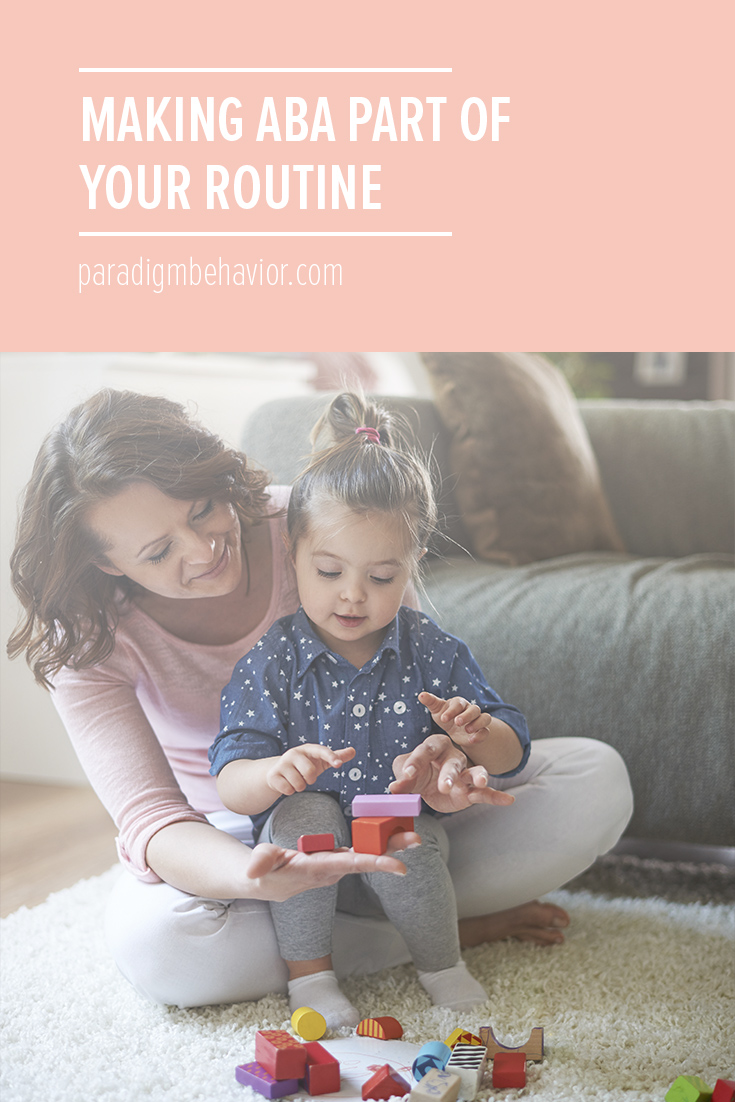Parent training can seem intimidating, especially when your notes require a glossary to reference. With all this talk about antecedents, reinforcement and discrete trial training, I often wonder if parents think they need to become ABA therapists themselves. If the subject of applied behavior analysis interests you, then I think that's great! But if all this acquired knowledge is for your child and to improve your family’s quality of life, then you shouldn’t feel like you need to step outside of your role as a parent (caregiver, sibling etc.).
When you're at home, you've got bellies to feed (including yourself), laundry to do, cuddles to give, and the lists goes on and on. Life always finds a way to keep you busy. So to help you manage your time, use your parent training sessions to ask your BCBA how you can incorporate ABA into your daily routines. I don't expect you to set aside an hour of your time to work on structured therapy every day, but with guidance, ABA concepts are can be applied anywhere by anyone.
I like to suggest starting small with something such as snack time, or engaging in one activity together, such as swinging in the park. From there, you’ll be able to focus on those ABA concepts such as prompting and reinforcement so that it feels more natural to you over time. I emphasize the phrase “over time” because in ABA we learn through patterns. Do you remember a time when you rearranged your furniture? How many times did it take you to adapt to a new routine of putting your keys here or not bumping into that table there? Not only are you to adapting to concepts like prompting and reinforcement, but your child is adapting to how they are learning from you as well.
If only changing problem behavior were as easy as rearranging furniture! When someone tells me “it takes time,” I already feel impatient. And when I learn something new, I feel inadequate, only because I’m waiting for the day this new thing I learned is natural for me. Please, do don’t hesitate to ask for support! Your BCBA will be able to guide you through your child’s behavior plan. You can even ask to record what it looks like so you can watch and re-watch, and you can reference when you need it.
So, how many days did it take you to adjust to your new routine when you rearranged the furniture? A couple of days? A week? Behavior analysts rely on data to make decisions. Again, I’m not hinting for you have a clipboard strapped to your hip, but data taking can be simplified for you at home. It might be a journal for you recollect events that happened that day or your BCBA may have you take data of just 5 minutes of your day. The data will help us see patterns.
For example, what if you and your family continued to bump into the table? Maybe the new arrangement isn’t working, and we need to find a better option. There are times when small improvements go unnoticed because you’ve given the behavior plan two weeks and it’s still a struggle. If you were to look at your notes, you might see that your child is crying for 3 minutes instead of 5 minutes. That’s a 40% decrease! Progress may be slower than you’d like, but even small improvements are still something to celebrate.
Even with all this talk about data, I don’t want to disregard your parental instincts. When I had my daughter, I kept track of everything (feeding, diapers, sleep) through this handy, dandy app. But even though I could use the app to keep track of that information, it wouldn’t tell me why my baby was crying. In other words, sometimes you have to use your instincts. If you’re not comfortable with something in the behavior plan, discuss it with your BCBA. They may be able to explain the procedure better or come up with other options.
ABA can create a learning curve for your family, but remind yourself that you are working to increase your child’s quality of life. Get a BCBA you are comfortable working with, so you have the support you need at home. Lastly, start small and celebrate progress, no matter how small. Remember you are one person, gradually take ABA in small doses so it becomes a natural part of your routine.



